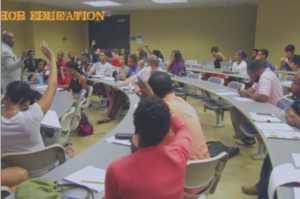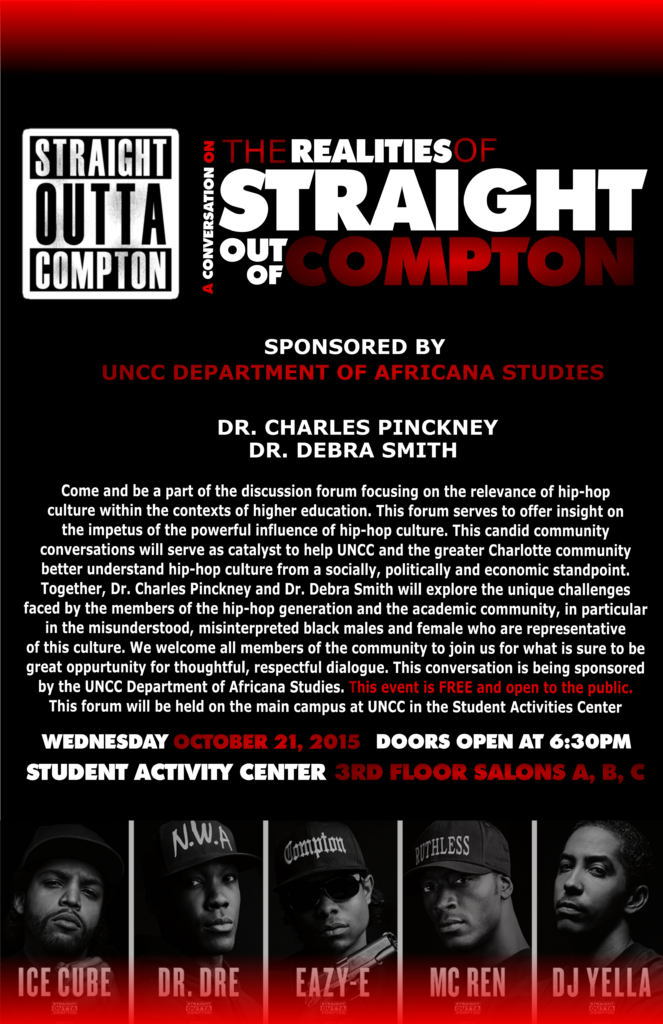Hip-Hop 101 Workshop
Dr. Charles Pinckney recently piloted a pedagogy-based curriculum workshop that focused on the best practices for educating the Hip-Hop Generation. Registered participants included teachers from Charlotte-Mecklenburg and other area schools. The two-day workshop focused on how to teach today’s millennial student, with emphasis on approaches to pedagogy that integrate elements of hip hop and popular culture with traditional learning practices.
Fifty rising freshmen from Dr. Debra C. Smith’s summer class— film criticism and education — also attended the sessions. The students talked one-on-one with teachers about perception issues, trust concerns, and feelings of inclusiveness in the classroom. “It’s a conversation that I wish I had with teachers prior to graduating [in high school],” remarked one student. Teachers were able to get insight on student learning barriers and markers for success in their classrooms and called the workshops and discussion “transformative” and “eye-opening.
Guest lecturer Andre’ Richardson was an additional resource to the workshop as he shared data and research on learning styles and instructional design. Richardson is currently working with the United States Department of Education in Washington DC as an Educational Specialist.
Pinckney demonstrated how the Hip-Hop Classroom can implement pedagogical tools that are familiar and comfortable for students. Thus, the elements of rap music, hip hop material culture, and student familiarity with some of the contemporary artists create an environment in which students can learn and thrive. For example, many rap artists lament the impact of poverty, joblessness, fractured family in their songs which urge students to critically examine the sociopolitical and economic implications of these issues. As part of the workshop, Dr. Pinckney produced and presented a documentary on the pedagogical relevance of Hip Hop in today’s education. The workshop and the documentary were made possible by a grant from the Chancellor’s Diversity Challenge Fund at the University of North Carolina at Charlotte.
Media and Violence
Dr. Debra C. Smith and Dr. Charles Pinckney were guest presenters at the 11 th Annual Youth Violence Prevention Conference in Charlotte NC in April 2016. The theme for the conference was Media Matters: The Impact of Violent Media on Today’s Youth. Their presentations focused on the comprehensive impacts of rap music on violence in the black community and the larger society.
Dr. Smith also served on a panel discussion about solutions to media violence, and on the planning committee for the conference alongside Dr. David Jacobs, Medical Director at the F. H. “Sammy” Ross, Jr. Trauma Center for Carolinas Healthcare System. Prior to the conference, Dr. Smith and Dr. Jacobs were featured on Charlotte Talks with Mike Collins to discuss ways in which the media can be a risk factor for adolescent/adult violent behavior; the many and varied forms entertainment violence can take; and what parents, teachers, counselors, and other youth advocates can do to minimize the impact of violent media on youth.
Over 100 case managers, social workers, psychologists, nurses, health and human service practitioners, teachers, and school administrators attended the conference.








